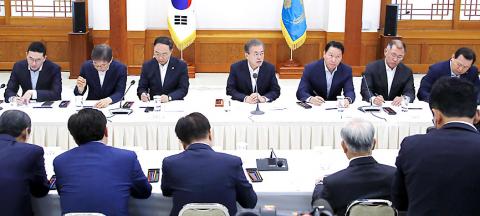South Korean President Moon Jae-in yesterday said Japan’s export curbs on key materials used by South Korean technology firms could be prolonged and his government would sharply boost spending to help reduce their reliance on Japanese suppliers.
Japan last week said it would tighten restrictions on exports of three materials used in smartphone displays and chips, citing a dispute with Seoul over South Koreans forced to work for Japanese firms during World War II.
The growing row threatens to disrupt supplies of chips and displays by South Korea’s tech giants Samsung Electronics Co and SK Hynix Inc, which count Apple Inc and other smartphone makers as customers and account for almost two-thirds of global chip production.

Photo: AP
“We can’t rule out the possibility that the situation would be prolonged, despite our diplomatic efforts to resolve the issue,” Moon said at a meeting with executives from South Korea’s top 30 conglomerates, including Samsung, Hyundai Motor Co and Lotte Group.
“It is a very regrettable situation, but we have no choice but to prepare for all possibilities,” Moon said, adding that the government would sharply increase spending to help firms source parts, materials and equipment domestically.
A “joint government-private sector response system is required as we are in an unprecedented emergency,” he said.
He also dismissed reported remarks by a politician in Japan that South Korea illegally shipped hydrogen fluoride imported from Japan to North Korea in contravention of international sanctions, calling them “groundless.”
Hydrogen fluoride, a chemical covered by the Japanese export curbs, can be used in chemical weapons.
“It is not desirable at all ... that Japan takes measures that deal a blow to our economy because of political purpose and makes remarks that link the measures to sanctions on North Korea,” Moon said.
South Korea’s bread-and-butter chip industry accounts for 20 percent of its exports.
“We will seek international cooperation as the measures will naturally have an adverse impact on the global economy,” Moon said.
Additional reporting by AFP

US PROBE: The Information reported that the US Department of Commerce is investigating whether the firm made advanced chips for China’s Huawei Taiwan Semiconductor Manufacturing Co (TSMC, 台積電), the world’s largest contract maker of advanced chips, yesterday said it is a law-abiding company, and is committed to complying with all applicable laws and regulations including export controls. The Hsinchu-based chip giant issued the statement after US news Web site The Information ran a story saying that the US Department of Commerce has launched a probe into TSMC over whether it breached export rules by making smartphone or artificial intelligence (AI) chips for China’s Huawei Technologies Co (華為). “We maintain a robust and comprehensive export system for monitoring and ensuring compliance,” the statement said. “If we

DEMAND FOR AI CHIPS: Net income in the third quarter surged 31.2% quarter-on-quarter to NT$325.26 billion, the strongest quarterly return in the company’s history Taiwan Semiconductor Manufacturing Co (TSMC, 台積電), the world’s biggest contract chipmaker, yesterday raised its revenue forecast to annual growth of 30 percent this year, thanks to strong and sustainable demand for artificial intelligence (AI) processors for servers. It was the second upward adjustment from 25 percent year-on-year growth estimated three months ago, despite recent concerns about whether the AI boom could be another technology bubble. “The demand is real. It’s real. And I believe it is just the beginning of this demand. Alright, so one of my key customers said the demand right now is ‘insane,’” TSMC chairman and chief executive C.C.

Starbucks Corp might have the more recognizable name, but 7-Eleven’s City Cafe remains the king of Taiwan’s fresh coffee market, helped by the convenience store chain’s extensive market presence and product diversification. President Chain Store Corp (PCSC, 統一超商), which runs both the 7-Eleven and Starbucks store chains in Taiwan, established the City Cafe brand in 2004. The brand took off when actress Gwei Lun-mei (桂綸鎂) became its spokesperson in 2007. City Cafe’s sales exceeded NT$10 billion (US$311.69 million) for the first time in 2015, surpassing the revenue of Starbucks Taiwan, and rose to more than NT$17 billion last year, exceeding the NT$14.98

COUNTRY-BASED: Setting ceilings on sales of the technology would tighten limits that originally targeted China’s ambitions in artificial intelligence amid security risks US officials have discussed capping sales of advanced artificial intelligence (AI) chips from Nvidia Corp and other American companies on a country-specific basis, people familiar with the matter said, a move that would limit some nations’ AI capabilities. The new approach would set a ceiling on export licenses for some countries in the interest of national security, according to the people, who described the private discussions on condition of anonymity. Officials in the administration of US President Joe Biden focused on Persian Gulf countries that have a growing appetite for AI data centers and the deep pockets to fund them, the people